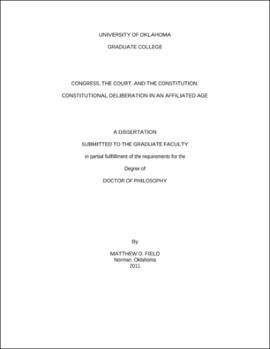| dc.description.abstract | The relationship between Congress and the Constitution and more specifically, constitutional deliberation within Congress, has been the focus of important scholarship (Pickerill, 2004; Devins & Whittington, 2005). This research furthers that enterprise through a comparative case study striving to understand the nature, content, and character of constitutional deliberation in the modern Congress. I examined a series of contemporaneous cases of constitutional interaction between Congress, the Supreme Court, and the Constitution itself, with particular emphasis on the content of congressional discourse. The cumulative evidence from the Civil Rights Act of 1991, the Partial-Birth Abortion Ban Act of 2003, and the Habeas Corpus Restoration Act of 2007 suggest that constitutional deliberation in Congress can best be understood through a "political regime" analysis (Dahl, 1957; Clayton & May, 1999; Pickerill & Clayton, 2004; Keck, 2007). More specifically, these cases, falling within reasonably the same "affiliated" era (Skowronek, 1997), demonstrate and illustrate the importance, and effects, of regime contestation: the normative engagement and debate between competing national governing coalitions. Operating as a part of this affiliated regime, Congress is a predictably highly partisan institution functioning within a highly political environment encompassing both fundamental "settled" values and secondary "unsettled" values. Its deliberation is for the most part symbolic and derivative in nature, acting under an umbrella of judicial supremacy and attempting to exert influence primarily on unsettled values, by which fundamental regime shifts are desired. These cases belie the notion of "settled" law and a "settled" regime, yet, despite these deviations from an undiluted "republic of reasons," Congress plays an important representational role by acting, and, further still, continues and perpetuates an ongoing dialogue (Fisher, 1988) with the other branches which would not arguably take place otherwise. | |
